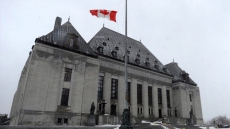OTTAWA — The Supreme Court of Canada says circumstantial evidence can be enough to convict someone of possessing child pornography.
In a decision Friday, the high court ruled unanimously that the Crown does not have to disprove any other possible explanation for how child pornography ends up on a computer owned by an accused.
"'Other plausible theories' or 'other reasonable possibilities' must be based on logic and experience applied to the evidence or the absence of evidence, not on speculation," Supreme Court Justice Thomas Cromwell wrote in the 32-page decision.
"Of course, the line between a 'plausible theory' and 'speculation' is not always easy to draw. But the basic question is whether the circumstantial evidence, viewed logically and in light of human experience, is reasonably capable of supporting an inference other than that the accused is guilty."
The decision concerned the case of Oswald Villaroman, who took his laptop to a Calgary computer shop for repairs in December 2009, and a service technician contacted the police after discovering child pornography downloaded through a file-sharing program.
A judge convicted Villaroman of child pornography possession following a prosecution based on circumstantial evidence such as the fact that he owned the computer, which had only one user account labelled with his name.
The Alberta Court of Appeal overturned the conviction last year, ruling the trial judge had erred excluding other possibilities as to how the pornography ended up on his computer.
The Supreme Court disagreed with the appeal judgment Friday, setting aside the acquittal.

The high court also handed a separate Charter of Rights issue related to the search and seizure of the laptop back to the Alberta Court of Appeal, which means Villaroman will have another chance to argue his case in the appeal court.
In asking the Supreme Court to consider the case, the Crown argued requiring prosecutors to disprove all other possible conclusions concerning the presence of pornography would increase the burden of proof to an impossible degree.
The Crown said this could have a devastating impact on the ability to prosecute child pornography cases and others that rely on circumstantial evidence.
The lawyers representing Villaroman, however, said the trial judge had simply erred in finding the defendant guilty beyond reasonable doubt in a case where the prosecution had brought virtually no evidence of possession.
The Supreme Court affirmed Friday that a judge or jury should consider other plausible theories and reasonable possibilities that point to innocence, and this might sometimes require the Crown to show why they would not apply.
But the high court agreed with the trial judge that this need not extend into the realm of make-believe.
"The Court of Appeal, my respectful view, erred by focusing on hypothetical alternative theories and, at times, engaging in speculation rather than on the question of whether the inferences drawn by the trial judge, having regard to the standard of proof, were reasonably open to him," Cromwell wrote.
The Supreme Court acknowledged there were "gaps" in the evidence the Crown presented at trial, but the appeal court went too far in analyzing those gaps, effectively retrying the case.
"In my view, while not every trier of fact would inevitably have reached the same conclusion as did the trial judge, that conclusion was a reasonable one," Cromwell wrote.
The Supreme Court did not set any new rules for instructing juries on how to deal with circumstantial evidence, but did suggest that in cases that rely only, or largely, on circumstantial evidence, it might be "helpful" for a judge to caution the jury about its limits.
The example Cromwell gave was looking out the window, seeing the road is wet and assuming it had been raining.
A closer look, however, might reveal that the sidewalks are dry, or that a sound that could be coming from a street-cleaning truck can be heard in the distance.
"The inferences that may be drawn from this observation must be considered in light of all of the evidence and the absence of evidence, assessed logically, and in light of human experience and common sense."


